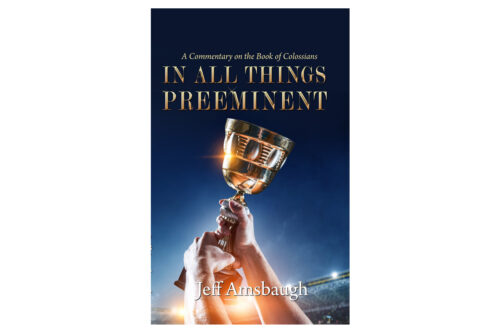-
The children of Israel had returned from Babylonian captivity and were eagerly anticipating great things from the Lord. They had returned to their homeland and had rebuilt their temple. Fifty years later, however, expectations were very low. Joshua and Zerubbabel had both died. The glory of the Lord had not filled the temple as Ezekiel said it would. And the day of miracles had passed with Elijah and Elisha. This was an apathetic age, an uneventful waiting period. Malachi writes to his fellow Jews to give them cures for apathy. This commentary explores those cures and presents them as hope for our current apathetic age.
-
All too often, pastoral candidates are merely asked to preach a couple of sermons to a local assembly before the vote is taken to call them to lead a church. Indeed, we often refer to our pastors as “preachers.” But is there more to pastoral leadership than pulpit communication? What does God require of the man who would shepherd the flock? This commentary explores the books of I Timothy, II Timothy, and Titus to discover God’s plan for pastoral ministry.
-
At times, we all feel like running away. Unfortunately, when we run away from our problems, we often create more. Thankfully, God positions Himself so that when we run from Him, we often run into Him. Such was the case with Onesimus. While on the run, he ran into God, and his life was forever changed. Discover how his master, Philemon, took him back and in so doing mirrors Christ who takes us back when we run away from Him.
-
When a person accepts Jesus Christ as his personal Saviour, he is immediately justified in the eyes of God. But how is a person justified in the eyes of men? This commentary takes you through the book of James and explains the defining hallmarks of Christianity. Here you will find practical tips on how to stay right in a world that is constantly drifting left.
-
We often think that trials are inappropriate for the Christian, and therefore we respond with bitterness and retaliation when they come. The Bible is clear, however, that trials are not foreign to the Christian life but a necessary component of it. Therefore, trials should not only be embraced but enlisted to serve God more effectively. This commentary explores the book of I Peter and develops concepts to help you submit the next time your Christian life is under fire.
-
The modern-day church is becoming increasingly weak in its doctrine. Teaching doctrine is not favorable and practicing doctrine is not popular. In fact, many churches have decided to abandon doctrine altogether because of its divisive nature. Today’s Christian must be properly equipped with Biblical doctrine to combat the heresies that dominate modern thought. Every Christian must know what they believe about core truths and why they believe them. This commentary trains you to be a heresy hunter. You will learn how to recognize the subtle differences in false teaching and how to avoid being trapped in unscriptural error.
-
If you have been saved for any length of time, you have probably seen some rift over Calvinism. Perhaps you feel uncomfortable believing that your lost relatives are unsaved because somehow God has not chosen them to salvation. That all having been said, however, you are not quite sure how this fits with the election passages of the Bible. In The Great Rift, Jeff Amsbaugh explores the roots of Calvinism and attempts to explain the five points of Calvin in light of God’s Word in order to help you the next time a rift over Calvinism comes your way.
-
Because many have recoiled from the fact that God would write a book about human sexuality, the Song of Solomon has often been allegorized as a book written to describe Christ’s love for the church. Does this mean that the book had to lay dormant for 900 years until the church was birthed? And how are we to explain God using Solomon, one of the worst husbands in history, to typify God’s love? Why is it that many who abhor allegorical interpretation are willing to accept it with regard to this Biblical work? In this commentary, we will discover that the Song needs no alteration or “deeper significance” to justify its place in the canon. To the contrary, this book will defend the fact that the proper use of human sexuality can turn a shepherd into a prince while its misuse can turn the world’s most celebrated sovereign into a beast. Indeed, God wrote the book of love.
-
Often we feel that a powerful apologetic is necessary to confront false religions and that courses in comparative religion are vital to evangelizing those from different faiths. When Paul, however, sought to rescue the Colossians from the Gnostic heresy that was pervading their town, he simply chose to exalt Christ. When Jesus is seen in all His glory, other faiths of necessity fade into the background. No competing system of thought can adequately replace the splendor of Jesus. Nothing can trump Christianity when Christ is in all things preeminent. We trust that this study of Colossians will help you see Jesus in all of His magnificence.
-
Esther lived in a materialistic society that was filled with antisemitic people who thought more of their personal advancement than the people of God who lived among them. In a day when women were treated as property, and Jews were thought worthy of extermination, God brought Esther to the throne for such a time as this. Through the help of Mordecai, the prayers of her fellow Israelites, and more importantly, through the invisible, providential hand of God, the tables were completely turned, and the Jews were protected while their enemies were destroyed. Thus, the book of Esther highlights the miraculous, protective intervention of God. Though the Lord is never mentioned in the book, He is present on every page. God is often most involved when His presence is not seen. The God of Esther can also help us in uncertain times by manifesting His presence through the lives of obscure volunteers for such a time as this.
-
The hallmark of orthodox Christianity is justification by faith. The thing that separates Christianity from every other religion is the fact that men are counted righteous before God by faith in the work of Christ independent of human merit. After we are saved, however, we sometimes feel that we must work for the smile of God. We believe that we are justified by faith but sanctified by works. Paul uses no other word but “foolish” to describe this mentality. In this commentary, you will learn that growth in the Christian life is accomplished by the same means as entrance into the Christian life - by grace through faith.
-
In previous ages, Christians lived in great anticipation of the Lord’s return. A belief in the imminent rapture of the church led many Christians to embrace holy living and aggressive evangelism. Times, however, have changed. Now, anyone who speaks of the Lord’s return is viewed as being on the same level as someone who claims to have seen Elvis in Burger King. Prophecy is seldom preached, and when it is, the preacher is viewed as a kook. The New Testament in general, and the books of I and II Thessalonians in particular, repeatedly emphasize, however, the fact that the King is coming. Our hope is that the pages of this commentary will help you live in light of that day.












